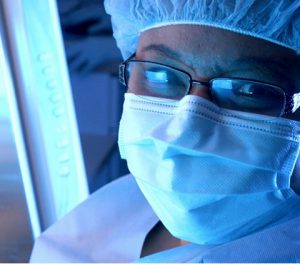

Angie Smith lights up when she talks about her job. Not just when she talks about the innovations and technical advances, or the donor interactions, or the recipient feedback. She lights up for all of it.
After 17 years with Miracles In Sight, Angie has done just about everything there is to do in the organization. And she still talks about it like it’s the most amazing place on earth.
 “It’s wonderful,” says Angie. “I’m hoping I can be here another 17 years.”
“It’s wonderful,” says Angie. “I’m hoping I can be here another 17 years.”
After graduating from college and working in administration at Lexington Memorial Hospital, she became interested in what was then called the North Carolina Eye Bank when one of the eye bank’s technicians came in to do a corneal recovery at the hospital. “I thought it was the most awesome thing ever,” says Angie.
With her interest piqued, she eventually joined the staff at the eye bank as a lab technician.
Since then, she has spent time leading the recovery team for the state of North Carolina and is currently back in the lab in distribution as a level 5 Certified Eye Bank Technician (CEBT). Angie works with surgeons on innovative ways to improve the surgical processes and techniques for both patients and surgeons.
“I work with the surgeons to make sure the tissue is prepared to their specifications,” says Angie. “…I actually helped create the DMEK program here at the eye bank.”
Perhaps the most difficult, and in some ways most meaningful role she has held was in the donor center. It was here that she talked with families during their most challenging times as they attempted to cope with the loss of a loved one.
Angie’s job then was to help families make informed decisions about eye, organ and tissue donation and to understand the profound effect it could have on many people’s lives.
“The donor center was by far the hardest job I’ve ever had to do here… from the emotional aspect of it,” says Angie.
While many families can rely on their loved ones having registered on DonateLife.net or as eye, organ and tissue donors on their driver licenses, others had to face making this decision right after their loved ones had passed away.
“You never knew how the family was going to react. Some were upset because they thought you were imposing,” says Angie. “Then while you were doing the paperwork, they would start to tell stories about their loved one. And it was almost like a way for them to be able to start revisiting those memories that they had with them. They would cry and you would cry, and you’d get through the paperwork… But you’d know when you were done that they felt really good about what they were doing.”
Angie’s experience with donor families highlights the importance of being an eye, organ and tissue donor and understanding the tremendous impact it can have on family members, potential recipients and advances in research.
“I had been here for a few years when my father suddenly passed away,” Angie explains. “I had never been on the other side of that phone. I knew what to expect. Still, it was one of the hardest times. But we immediately knew that this was what we wanted to do… and it gave us a sense of closure.”
Angie continues, “A lot of times it’s almost therapeutic for families to know that their loved one is doing something that is going to help someone else out.”
As Angie explains, eye donation is somewhat unique, which may cause some people, even recipients, to overlook the importance of donation. “Some people can take (eye donation) for granted because it’s not a heart or other organ, but it makes such a difference in the recipient’s life. The stories we get from recipients are so touching,” she says. “Often they want to reach out and thank donor families for their kindness.”
Individuals can register as eye, organ and tissue donors through the DMV or the Donate Life website. Through Donate Life, donors can designate whether to make their eye and other tissues available for medical research and educational purposes, as well as for transplant.
Eye tissue used in medical research allows surgeons and other medical professionals to learn and perfect techniques, treatments and medications that can impact care today and well into the future.
Angie’s interest in the eye, it seems, comes to her naturally. Her mother, who enjoyed a 30-year career as a certified ophthalmic assistant, told her that she found her niche. However, what has driven Angie all these years has been an insatiable enthusiasm for learning. “I’m the kind of person where if there’s something to learn, I want to learn it,” she explains.
According to Angie, it all boils down to passion. “It’s a job that changes every day, every eye is different,” she continues. “It’s also the sense of knowing that what we are doing is helping people not just in this state, but helping people worldwide.”
You can register to be an eye, organ and tissue donor via Donate Life.
Website: donatelife.net
North Carolina: donatelifenc.org
South Carolina: donatelifesc.org







